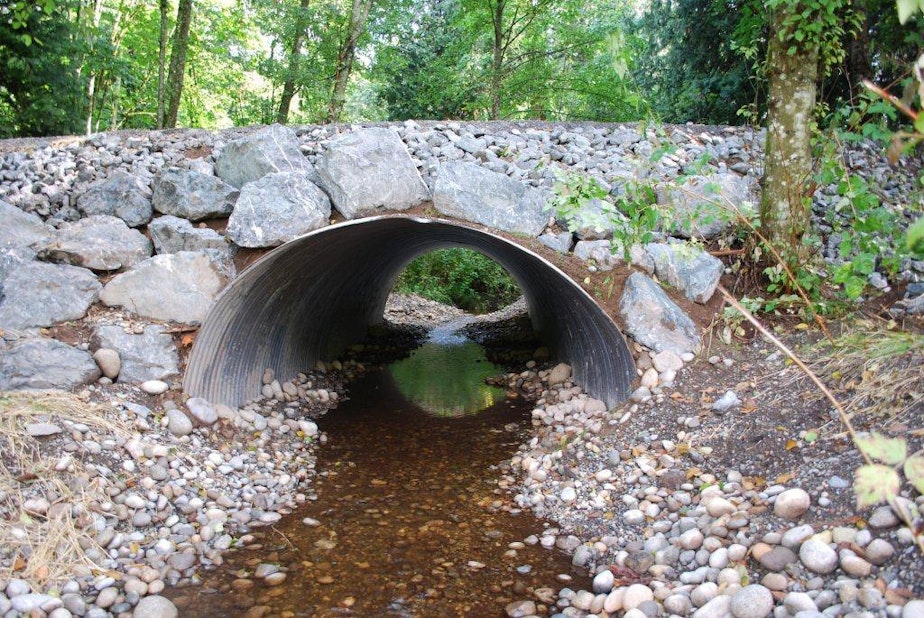Tribes take Washington to Supreme Court over salmon-blocking culverts

Kim Malcolm talks with University of Washington law professor Robert Anderson about a U.S. Supreme Court case involving Native American fishing rights in Washington state. At issue is whether Washington state should pay to fix culverts, which block the passage of salmon.
What are the roots of this dispute?
Anderson: The tribes signed a treaty with the United States in 1855 whereby they gave up almost all of their territory in western Washington in exchange for smaller reservations — and most importantly for the right to go to their accustomed stations to fish as they always had.
The allegation in this case is that the state is failing to adequately construct and maintain culverts, which has degraded the fishery to a substantial degree, and that violates the treaty.
You support the Washington tribes in this case. Why?
Sponsored
I think the tribes have the correct legal argument. The Supreme Court has dealt with these issues several times and ruled in favor of the tribes repeatedly.
In 1905, there was a case where private landowners tried to stop Yakima tribal citizens from fishing off the banks of privately owned lands near the Columbia River.
The Supreme Court ruled that the tribal citizens had a right to cross private property to fish. The landowners had fish wheels in the river that were blocking fish from getting to the tribe's usual fishing spot. The Supreme Court said that was impermissible — that the state could not grant a license to block fish from getting to the place where the tribe had a treaty right to catch them.
This current case is really on all fours with the 1905 case. These culverts have been shown to impede fish passage going back upstream and also coming downstream.
Washington Attorney General Bob Ferguson declined to be interviewed by us, but he did send along a statement. It says the state is being required to fix some culverts that won't benefit salmon. And in his opinion that makes no sense. What's your response to his argument?
Sponsored
I don't know what he means when he says there may be a culvert that's not causing as much harm as another.
The district court built in flexibility so if there is a particular culvert that isn’t blocking any fish habitat, then it will come off of the list of culverts they have to repair.
One of the reasons this case was brought is because everyone knew that these culverts were causing harm. The state has a plan to repair them on its own, but it's going to take 99 years. The tribes and the United States attempted to negotiate with Washington state over accelerating that schedule.
The state said it didn't have enough money to increase the timing of the culvert repairs, and so the lawsuit was brought. The judge effectively shrunk the period from 99 years to a 17 year schedule.
This particular case is just one of many where Washington tribes have fought for their treaty rights. What’s the bigger picture behind this ongoing legal wrangling?
Sponsored
It's the fact that the tribes were preexisting sovereigns when Washington state came into being. It was only because of Indian treaties that made the land available for non-Indians, and the Indians just didn't go away. The tribes stayed and they reserved property rights, hunting and fishing rights, and also the right to be sovereign and not have interference from the state.
Historically, states have hated that. You look at the pages of an Indian law casebook and you'll see Washington state mentioned in many cases, because there's been a lot of litigation between the tribes and the state.


